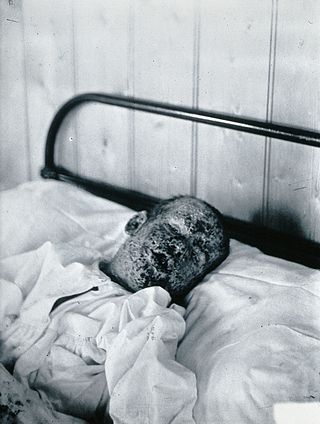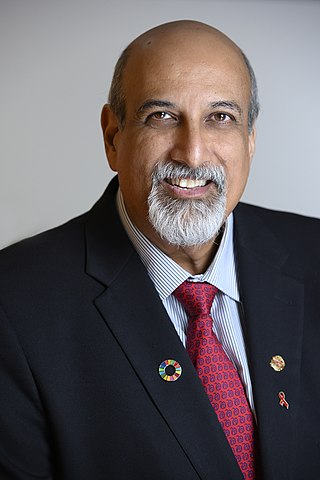
Universal precautions refers to the practice, in medicine, of avoiding contact with patients' bodily fluids, by means of the wearing of nonporous articles such as medical gloves, goggles, and face shields. The infection control techniques were essentially good hygiene habits, such as hand washing and the use of gloves and other barriers, the correct handling of hypodermic needles, scalpels, and aseptic techniques.

The Carter Center is a nongovernmental, nonprofit organization founded in 1982 by former U.S. President Jimmy Carter. He and his wife Rosalynn Carter partnered with Emory University after his defeat in the 1980 United States presidential election. The center is located in a shared building adjacent to the Jimmy Carter Library and Museum on 37 acres (150,000 m2) of parkland, on the site of the razed neighborhood of Copenhill, two miles from downtown Atlanta, Georgia. The library and museum are owned and operated by the United States National Archives and Records Administration, while the center is governed by a Board of Trustees, consisting of business leaders, educators, former government officials, and philanthropists.

Tropical medicine is an interdisciplinary branch of medicine that deals with health issues that occur uniquely, are more widespread, or are more difficult to control in tropical and subtropical regions.

The United States President's Emergency Plan For AIDS Relief (PEPFAR) is the global health funding by the United States to address the global HIV/AIDS epidemic and help save the lives of those suffering from the disease. The U.S. allocation of over $110 billion marks the largest investment by any country has ever made towards combating a single disease. Launched by U.S. President George W. Bush in 2003, as of May 2020, PEPFAR has provided cumulative funding for HIV/AIDS treatment, prevention, and research since its inception, making it the largest global health program focused on a single disease in history until the COVID-19 pandemic. PEPFAR is implemented by a combination of U.S. government agencies in over 50 countries and overseen by the Global AIDS Coordinator at the United States Department of State. As of 2023, PEPFAR has saved over 25 million lives, primarily in sub-Saharan Africa.
The National Center for HIV/AIDS, Viral Hepatitis, STD, and TB Prevention (NCHHSTP), formerly the National Center for HIV, STD, and TB Prevention (NCHSTP) is a part of the Centers for Disease Control and Prevention and is responsible for public health surveillance, prevention research, and programs to prevent and control human immunodeficiency virus (HIV) infection and acquired immunodeficiency syndrome (AIDS), other sexually transmitted diseases (STDs), viral hepatitis, and tuberculosis (TB). Center staff work in collaboration with governmental and nongovernmental partners at community, State, national, and international levels, applying well-integrated multidisciplinary programs of research, surveillance, technical assistance, and evaluation.
Taiwan's epidemic of HIV/AIDS began with the first case reported in December 1984. On 17 December 1990 the government promulgated the AIDS Prevention and Control Act. On 11 July 2007, the AIDS Prevention and Control Act was renamed the HIV Infection Control and Patient Rights Protection Act.
Globalization, the flow of information, goods, capital, and people across political and geographic boundaries, allows infectious diseases to rapidly spread around the world, while also allowing the alleviation of factors such as hunger and poverty, which are key determinants of global health. The spread of diseases across wide geographic scales has increased through history. Early diseases that spread from Asia to Europe were bubonic plague, influenza of various types, and similar infectious diseases.
The very high rate of human immunodeficiency virus infection experienced in Uganda during the 1980s and early 1990s created an urgent need for people to know their HIV status. The only option available to them was offered by the National Blood Transfusion Service, which carries out routine HIV tests on all the blood that is donated for transfusion purposes. The great need for testing and counseling resulted in a group of local non-governmental organizations such as The AIDS Support Organisation, Uganda Red Cross, Nsambya Home Care, the National Blood Bank, the Uganda Virus Research Institute together with the Ministry of Health establishing the AIDS Information Centre in 1990. This organization worked to provide HIV testing and counseling services with the knowledge and consent of the client involved.

The eradication of infectious diseases is the reduction of the prevalence of an infectious disease in the global host population to zero.

A sexually transmitted infection (STI), also referred to as a sexually transmitted disease (STD) and the older term venereal disease (VD), is an infection that is spread by sexual activity, especially vaginal intercourse, anal sex, oral sex, or sometimes manual sex. STIs often do not initially cause symptoms, which results in a risk of transmitting them on to others. The term sexually transmitted infection is generally preferred over sexually transmitted disease or venereal disease, as it includes cases with no symptomatic disease. Symptoms and signs of STIs may include vaginal discharge, penile discharge, ulcers on or around the genitals, and pelvic pain. Some STIs can cause infertility.
With 1.28 percent of the adult population estimated by UNAIDS to be HIV-positive in 2006, Papua New Guinea has one of the most serious HIV/AIDS epidemics in the Asia-Pacific subregion. Although this new prevalence rate is significantly lower than the 2005 UNAIDS estimate of 1.8 percent, it is considered to reflect improvements in surveillance rather than a shrinking epidemic. Papua New Guinea accounts for 70 percent of the subregion's HIV cases and is the fourth country after Thailand, Cambodia, and Burma to be classified as having a generalized HIV epidemic.

Dr. Kamiar Alaei and his brother Dr. Arash Alaei are two Iranian HIV/AIDS doctors who were detained in Tehran's Evin prison from June 2008 through Dec 2010 and August 2011, respectively. Prior to their arrest, they developed harm-reduction programs in Iran and developed the program Global Health in the Middle East and Central Asia, an HIV/AIDS training program for regional health experts.
Humanitarian Action is a non-governmental charitable organization based in St. Petersburg, Russia. Humanitarian Action carries out programs and outreach for HIV/AIDS prevention, and aiding street children, intravenous drug users, and sex workers. The program, founded in June 2001, grew out of the French NGO Doctors of the World, which created medical-social programs in Russia starting in 1995.

Guinea faces a number of ongoing health challenges.

Kevin Andrew Fenton is a public health physician and infectious disease epidemiologist. He is the London regional director at Office for Health Improvement and Disparities, regional public health director at NHS London and the statutory health advisor to the mayor of London, Sadiq Khan. He is the current president of the United Kingdom Faculty of Public Health and holds honorary professorships with the University College London and London School of Hygiene and Tropical Medicine. He is the 2024/25 president of the British Science Association.
Infectious diseases within American correctional settings are a concern within the public health sector. The corrections population is susceptible to infectious diseases through exposure to blood and other bodily fluids, drug injection, poor health care, prison overcrowding, demographics, security issues, lack of community support for rehabilitation programs, and high-risk behaviors. The spread of infectious diseases, such as HIV and other sexually transmitted infections, hepatitis C (HCV), hepatitis B (HBV), and tuberculosis, result largely from needle-sharing, drug use, and consensual and non-consensual sex among prisoners. HIV and hepatitis C need specific attention because of the specific public health concerns and issues they raise.
The United States Intelligence Community (IC) has a long history of producing assessments on infectious diseases. Most of these papers are distributed to government administrators and inform the choices of policymakers. Three of these assessments stand out as analytical products that have had important impact on the awareness, funding and treatment of infectious diseases around the world. The first paper is the National Intelligence Estimate on the Global Infectious Disease Threat, the second paper is the assessment on the Next Wave of HIV/AIDS, and the third paper was the assessment on SARS. This page summarizes the findings of these three papers and provides information about their impact.

Salim S. Abdool Karim is a South African public health physician, epidemiologist and virologist who has played a leading role in the AIDS and COVID-19 pandemic. His scientific contributions have impacted the landscape of HIV prevention and treatment, saving thousands of lives.

Eradication of dracunculiasis is an ongoing program. Dracunculiasis, or Guinea worm disease, is an infection by the Guinea worm that causes severe pain and open wounds when guinea worms exit the body through the skin. In 1986, there were an estimated 3.5 million cases of Guinea worm in 20 endemic nations in Asia and Africa. The number of cases has since been reduced by more than 99.999% to 14 in 2023 with only six countries remaining: South Sudan, Chad, Mali, Ethiopia, Angola, and Central African Republic.

Demetre C. Daskalakis is an American physician and gay health activist serving as director of the National Center for Immunization and Respiratory Diseases (NCIRD), and former director of the Division of HIV Prevention in the National Center for HIV/AIDS, Viral Hepatitis, STD, and TB Prevention. During the administration of Joe Biden, he was appointed deputy coordinator of the White House's mpox response to the 2022–2023 outbreak of the disease.











